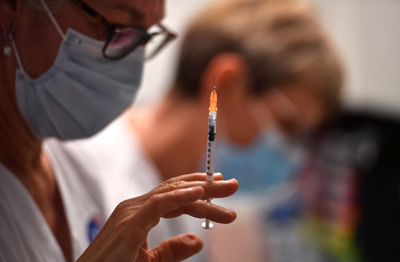Namibia has secured a Covid-19 vaccine for health workers, severe patients and the vulnerable, which is due to arrive end of January or early February.
Health minister Dr Kalumbi Shangula said the rolling out of the small scale “first wave” of deliveries forms part of progress made in preparation to acquire suitable Covid-19 vaccines.
According to Shangula, the nation vaccine taskforce was busy at work to put mechanisms and logistics in place to roll out the vaccine.
Shangula explained government will prioritise frontline health care workers, the vulnerable and severe Covid-19 patients once the vaccine becomes available.
Briefing the nation yesterday during an update on the latest government response measures, Shangula reiterated the country has made a further financial commitment through the Covax facility to settle the remaining balance of approximately N$137 million for the Covid-19 vaccine.
Last year, the country paid over N$29 million to acquire vaccine doses enough for about 20% of the population or 508 200 people. “The facility has informed us on the 6 January 2021 that it may be in a position to initiate a small scale “first wave” of deliveries using the Pfizer vaccine as early as the end of January or February,” he indicated.
To achieve a sufficient level of herd immunity, Shangula added government need to achieve a coverage rate of 60-80% of the population. Apart from the Covax facility, the minister announced there have been engagements with Pfizer on a bilateral basis, China, Russia and other countries that are making great progress in the manufacturing of Covid-19 vaccines for possible bilateral deals and or donations.
Pfizer is an American pharmaceutical giant – and its German partner, BioNTech SE, were among the first companies to indicate they were developing a vaccine.
The minister indicated additional resources need to be secured for the acquisition of more doses to vaccinate at least up to 60% of the population to achieve a desirable level of herd immunity.
Herd immunity is when a large part of the population is immune to a specific disease.
Shangula, therefore, called upon the medical aid industry to support beneficiaries of medical aid schemes to access the vaccine.
“In the same vein, we will be engaging corporate Namibia for support. I have to acknowledge the support to date that corporate Namibia has provided during the course of the pandemic – and once again, call for the support of all peace-loving Namibians, our partners, and friends to join hands in ensuring access and introduction of the vaccine,” Shangula appealed.
He said consultations, in coordination with the finance ministry, the Namibia Financial Institutions Supervisory Authority (Namfisa) and the Namibian Association of Medical Aid Funds (Namaf) have started exploring an avenue to fund the vaccine.
“We will provide additional details in coming days,” he said.
Logistics
He said the inventory of cold chain equipment for storage and distribution of the vaccine is almost complete; however, additional equipment for vaccines that require extreme cold temperatures may be required.
The taskforce is also planning for human resource and training to deliver the vaccine rapidly once it becomes available.
The National Medicine Regulatory Council (NMRC) is finalising the framework approval of the World Health Organisation (WHO) prequalified and other vaccines once dossiers become available.
“Public education and community engagement on correct and authentic information about the vaccines is ongoing. The vaccine will save lives once it becomes available,” Shangula informed.
In the past few weeks, especially starting from the second week of December 2020, Namibia has witnessed greater numbers of infections, hospitalisations and deaths due to Covid-19. As at yesterday, the country had 3 499 active cases, 25 408 recoveries and 271 deaths due to the pandemic.
Infections among health workers have also gone up tremendously, Shangula said.
This, he said, has placed increased pressure on the health system and facilities – both public and private.
Without a radical change in the behaviour of people to stem the avalanche of Covid-19 infections in the country, Shangula warned Namibia may face unprecedented devastation by this pandemic.
“Already, the pandemic has negatively impacted our way of life and it continues to do so. On the economic front, the economy has been severely battered with massive losses of jobs and closure of many businesses,” he stressed.
“This reality tells us that we are confronted with unprecedented challenges and difficulties, which demand united action and common purpose.” - anakale@nepc.com.na


